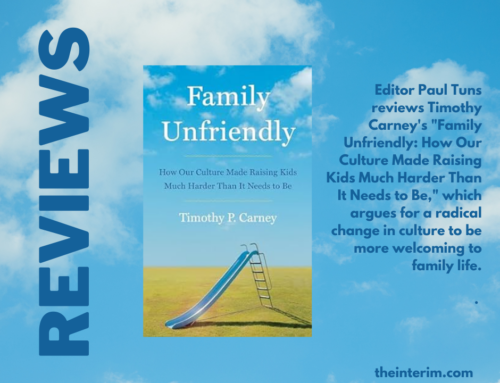Anti-euthanasia leader wants a ‘human rights bioethic’
Culture of Death: The Assault on Medical Ethics in America by Wesley J. Smith (Encounter Books, $36.75, 285 pages).
In Culture of Death: The Assault on Medical Ethics in America, Wesley J. Smith, author ofForced Exit: The Slippery Slope from Assisted Suicide to Legalized Murder and an attorney for the International Anti-Euthanasia Task Force, indicts the medical establishment for allowing itself to be influenced by a “the mainstream bioethics movement [that] embraces dehumanizing ideas and health policies that I believe can fairly, if provocatively, be described as ‘medical cleansing’.”
The utilitarianism of these bioethicists who affect the public debate and thus policy-making decisions of government and regulatory and professional bodies has replaced the Hippocratic Oath’s first injunction to “do no harm.”
The harm comes in a myriad of forms. From medical neglect to intentionally withholding treatment, from improper health care rationing to euthanasia and doctor-assisted suicide, from using incapacitated patients in medical experimentation to redefining death in order to exploit people as organ sources, Smith catalogues the corruption of a once noble profession.
Organ donation is sometimes more accurately described as organ harvesting and Smith reports a particularly gruesome example. The Loma Linda University Medical Center began a program for transplants for anencephalic babies until it was found that doctors were referring handicapped infants to have their organs harvested. This utilitarian approach to not just the practice of medicine but the value of people is at the root of the assault on medical ethics.
Hospitals are commonly if not routinely denying medical care to preterm infants, the terminally ill, disabled and the elderly and “pulling the plug” on those who are incapacitated, in a so-called “persistent vegetative state.” In some countries food and water are withheld from newborn babies with spina bifida or Down syndrome. The wishes of the elderly are often ignored by a health profession that thinks it knows best, even when the “medical” decisions they make are lethal to the patient.
One of the ominous issues raised by Smith is of patients misdiagnosed and not given enough time to recover. He relates the story of a man who was declared to be in a permanent vegetative state; the family asked for a second opinion, which found that the man had suffered brain seizures. As a result, instead of being denied treated and left to die, the man left the hospital within a week.
Smith notes that although the euthanasia agenda has been in full force for only the past two decades, it has its intellectual antecedents going back much further. Most notorious in the twentieth century was Nazi Germany which practiced widespread euthanasia as part of its eugenic program. Hitler is said to have been deeply affected by the book Permission to Destroy Life Unworthy of Life by Karl Binding and Aldred Hoche. The problem with so many in the medical profession today is that they play God, making not medical decisions about the best course of care but decisions about which lives are worthy of living.
Perhaps this disturbing trend is no more evident than in the use a “Futile Care Theory” which makes judgements about “the moral worth of sick and disabled people.” The argument of “futilitarians,” as Smith calls them, is that at “a certain stage of age, illness or injury, any further treatment other than comfort care is ‘futile’ and should be withheld or withdrawn” regardless of the patient’s (or family’s) wishes. Bioethicists and doctors dismiss the wishes of such people because, using a utilitarian argument, the resources could be used elsewhere for efficiently, on someone who might live a longer or more rewarding life.
And sometimes, rather than explain to a family that it would be “futile” to continue treating a loved one, doctors terminate a patient’s life without his or her or the family’s consent. There was a rather infamous case of this in 1998 involving a 76-year-old Montreal man, Herman Krausz, who was removed from a respirator against his wishes and the wishes of his family, and in spite of Mr. Krausz’ desire to see an estranged brother before he died. Mr. Krausz was coherent, alert and mentally competent to make his own decisions. At an inquest doctors claimed they were unconvinced Krausz wanted treatment to continue. Smith says the medical establishment often makes assumptions or read in their own beliefs about the wishes of patients. “Instead of definitely determining their patient’s desires, they simply turned down the respirator.”
This mentality comes perilously close to believing the sick, disabled and elderly have a duty to die. The medical establishment, overly influenced by bioethicists, has become more concerned with issues other than the best care for the patient, obsessed with such things as costs and desire to protect the family from an unpleasant process of dying that they, the medical professionals, have lost their sense of mission, that first they must do no harm.
Today, more and more doctors are making judgements about which lives are worthy of life. As one wag has said, increasingly we may not have the choice to choose life. The descent of a medical profession which helps heal and comfort people to one complicit in patient deaths is all-too-well (and horrifyingly) documented in Smith’s Culture of Death.
Smith had a modest goal in writing his book: “to alert my readers to the intentional undermining by bioethicists of the fundamental moral principles that have long governed our society, and to invite them into the crucial, ongoing debates about their health care – debates that will, quite literally, determine the future of Western medicine.” Armed with the knowledge and arguments in this book, we can now face a corrupted profession, first, as Smith notes, to contain the damage that is done, but eventually to direct it “toward a human rights bioethics” that affirms the value of life.
Wesley Smith will be one of the featured speakers at the upcoming conference of the Euthanasia Prevention Coalition, to be held April 28 in London, Ont. For more information, please call (519) 439-3348 or 1-877-439-3348 or e-mail euthanasiaprevention@on.aibn.com.




